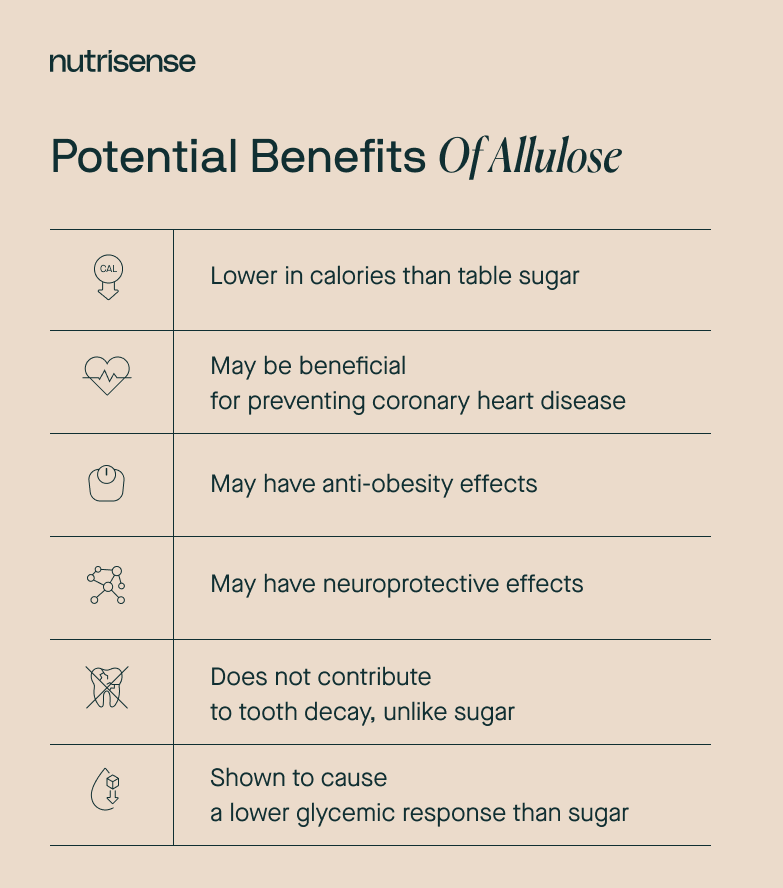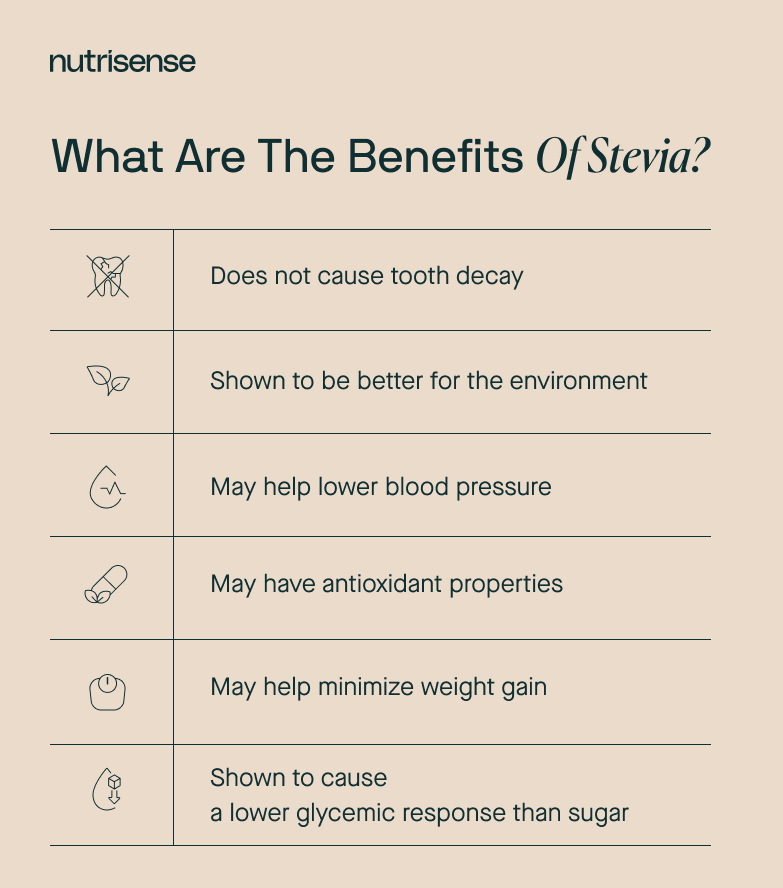Allulose vs. Stevia: Is Stevia Good for Diabetics?

Key Takeaways
Added sugar is disguised under more than 60 different names and may seem like it’s sneaking its way into more foods than ever before. Because of the negative effects that excessive sugar consumption can have on your overall health, you may be considering sugar alternatives to satisfy your sweet tooth.
If you want to reduce your added sugar intake but still want to enjoy some sweetness now and again, look no further! We’re going to take a closer look at two widely available natural sugar substitutes: allulose and stevia.
By the end of this article you’ll know:
- How allulose and stevia compare to sugar
- What effect both of these natural sweeteners might have on your health
- Which sweetener you should opt for if you’re looking for a healthier sugar substitute
A Quick Recap on Sugar

Research has shown that a diet high in added sugars can greatly increase your risk of a number of different health conditions. These include things like high blood pressure, insulin resistance, fatty liver disease, obesity, type 2 diabetes, and rheumatoid arthritis.
High sugar consumption is also linked to skin problems, increased inflammation in the body, and even certain kinds of cancer. The American Heart Association recommends limiting your daily intake of sugar to less than six percent of your daily caloric intake.
As a result, a number of natural and artificial sweeteners are now commonly used in place of regular sugar to combat some of these effects.These sweeteners include things like:
But are any of these sweeteners actually healthier for you? And which is best to choose? Let’s take a deeper look at two of the natural sweeteners on this list to find out.
What is Allulose?
Allulose is a relatively new low-calorie sweetener that you may not be familiar with—a 2021 consumer survey found that only 15 percent of consumers had heard of it. Like sugar, this sweetener is odorless and comes in a white, powdery crystal form.
Allulose, also called D-allulose or D-psicose, is a natural sugar that is found in plants like wheat, sugar cane, maple syrup, figs, and raisins. Interestingly, allulose actually shares the same molecular formula as fructose.
It tastes very similar to traditional sugar, though it is only about 70 percent as sweet. Allulose is considered a rare sugar because it’s found in such small quantities in nature. As a result, the cost of production is high and it isn’t used as often as many other natural sugar substitutes.
It is generally recognized as safe (GRAS) by the FDA, and has been approved for use as a sugar substitute in baked goods, chewing gum, hard candy, frozen dairy desserts, yogurt, cereals, and carbonated and non-carbonated diet drinks.
Allulose and Blood Sugar

Allulose tastes very similar to sugar, but it has been shown to result in a lower glycemic response. Animal studies have shown that consumption of allulose doesn’t interfere with glucose tolerance or insulin sensitivity in rats.
This natural sweetener has even been shown to reduce postprandial glucose levels and lower HbA1C levels in rats with type 2 diabetes. Human studies also confirm that allulose may positively benefit blood sugar. According to Dr. Ramit Singh, "unlike sugar, allulose is absorbed minimally in the gut and excreted largely unchanged, resulting in a negligible effect on blood sugar levels. This makes it suitable for individuals with diabetes or prediabetes."
A 2021 randomized, crossover study of people without diabetes also found that allulose reduced postprandial glucose levels after subjects had eaten sucrose. Another recent study found that allulose improved postprandial glucose levels in people with type 2 diabetes who were fasting for Ramadan.
While studies are promising, more large-scale research is needed to confirm their findings.
Other Allulose Benefits

Allulose has been shown to benefit more than blood sugar. Here are a few of the other demonstrated benefits of using allulose instead of traditional sugar:
- Allulose has approximately 0.4 calories per gram, compared with four calories per gram in traditional sugar.
- Allulose may have anti-obesity effects that can help with weight loss. Research shows that consumption of allulose can increase energy expenditure and reduce abdominal fat in animal models.
- Allulose may have neuroprotective effects, and early research shows promise for its use as a treatment for degenerative disease, though more in vivo research is needed.
- Allulose may be beneficial for coronary heart disease by regulating and improving cholesterol metabolism.
- Allulose may also have antioxidant effects, though more in vivo studies are needed to confirm these findings.
- Unlike traditional sugar, allulose is non-cariogenic, meaning it does not contribute to tooth decay.
Allulose Downsides
While it seems like there are many things to love about allulose, there are a few downsides. Here are a few the potential drawbacks:
- As mentioned earlier, allulose is expensive to produce. As a result, it may not be as readily available as other natural sugar substitutes.
- Like some other alternative sweeteners, allulose may cause some gastrointestinal issues such as bloating. Some sources suggest a maximum total daily intake of 0.9 grams per kilogram of body weight as a result.
What is Stevia?
As we discussed in our article on Stevia vs. Splenda, stevia extract is derived from a perennial shrub called Stevia rebaudiana. The sweetness in stevia extract comes from compounds called stevioside and rebaudioside A and C.
Stevia is also sold as a tabletop sweetener under many brand names, including Splenda and Truvia. However, while stevia itself is a natural sugar, when you compare Stevia in the Raw vs. Truvia, these other brands may also contain a synthetic sugar alcohol called erythritol.
Unlike allulose, stevia is 200 to 300 times sweeter than sugar. Stevia is commonly used as a sugar substitute in diet sodas, low-sugar juices, flavored waters, canned fruits, ice cream, yogurt, syrups, baked goods, and many other foods.
Stevia and Blood Sugar
Like allulose, stevia has a sweet taste. However, stevia imparts no calories.
One 2020 study of people with type 2 diabetes found that a daily cup of stevia-sweetened tea had no effect on blood sugar control, insulin production, or fasting blood sugar levels. Rebaudioside A, one of the sweet compounds found in stevia, has also been shown to improve insulin sensitivity in some cases.
Other Stevia Benefits

There are many benefits to using stevia as a replacement for traditional sugar. Here are a few more:
- Like allulose, stevia is also non-cariogenic and may not cause tooth decay.
- Stevia has a lower carbon and water footprint than many other sweeteners, making it a more sustainable alternative.
- Animal studies have shown that stevia may have antihypertensive effects, though human studies are needed to confirm these findings.
- Stevia may have antioxidant properties: it has been shown to neutralize free radicals in vitro. However, more in vivo studies are still needed.
- Animal studies have shown that stevia may have anti-obesity effects, but more human studies are needed.
Stevia Downsides
Here are some of the potential disadvantages of stevia:
- Some people may find that stevia has a bitter, licorice-like aftertaste.
- Studies have shown that stevia may also affect the bacteria in your gut microbiome. Whether this is a true negative effect or not is still under investigation.
- Some animal studies involving high stevia intakes have shown potential negative effects on fertility. However, these effects have not been replicated in human studies.
- Animal studies have shown that crude stevia abstracts may have allergenic potential. This has not been well-studied, and crude stevia abstracts are not currently approved by the Food and Drug Administration for use as sweeteners.
Stevia vs. Allulose: Which is Better?

If you find yourself choosing between stevia and allulose, it all comes down to your personal preference, and what you want to use them for! Neither of these sweeteners is necessarily healthier than the other.
While both of these sugar substitutes may still require further research, both stevia and allulose have minimal documented side effects of health risks in humans. They also have notable upsides when it comes to metabolic health, most notably their potential positive effects on blood sugar control and insulin levels.
As bariatric physician Dr. Kevin Huffman shares, "sugar alternatives are progressively demonstrating their beneficial impact on metabolic health. Substituting high-calorie sugars with low or no-calorie substitutes—such as allulose and stevia—is a significant strategy for calorie reduction and weight management; this transition contributes to the lowering of metabolic syndrome risk."
Feel free to try both and see what you think. You may also consider consulting a nutritionist to see what sweeteners might be a better choice for you and your health. Regardless of what you choose, here are a few key takeaways to keep in mind:
Carbohydrate Content
Both of these sweeteners contribute little to nothing in the way of calories. This means that each of these natural sugar substitutes contain zero (in the case of stevia) or very minimal (in the case of allulose) net carbs and are keto-friendly sweeteners.
Zero-calorie sweeteners like stevia also have a glycemic index of zero due to their low carb content. Allulose contains very few calories and also has a low glycemic index.
Taste
One important consideration when it comes to taste is that stevia is 200 to 300 times sweeter than sugar. Stevia is much sweeter than allulose, which is only 70 percent as sweet as sugar.
However, stevia has been reported to have a bitter aftertaste, while allulose tastes very similar to sugar.
Find the right Nutrisense programto turn insight into progress.
Go Beyond Glucose Data with Nutrisense
Your glucose can significantly impact how your body feels and functions. That’s why stable levels are an important factor in supporting overall wellbeing. But viewing glucose isn't enough. Nutrisense, you’ll be able to learn how to use your body's data to make informed lifestyle choices that support healthy living.
One-to-one coaching
Sign up to access insurance-covered video calls to work with a glucose expert: a personal registered dietitian or certified nutritionist who will help tailor your lifestyle and diet to your goals.
Monitor and measure what matters
With the Nutrisense CGM Program, you can monitor your glucose with health tech like glucose biosensors and continuous glucose monitor (CGM)s, and analyze the trends over time with the Nutrisense App. This will help you make the most informed choices about the foods you consume and their impact on your health.
Find your best fit
Ready to take the first step? Start with our quiz to find the right Nutrisense program to help you take control.

Heather is a Registered and Licensed Dietitian Nutritionist (RDN, LDN), subject matter expert, and technical writer, with a master's degree in nutrition science from Bastyr University. She has a specialty in neuroendocrinology and has been working in the field of nutrition—including nutrition research, education, medical writing, and clinical integrative and functional nutrition—for over 15 years.




